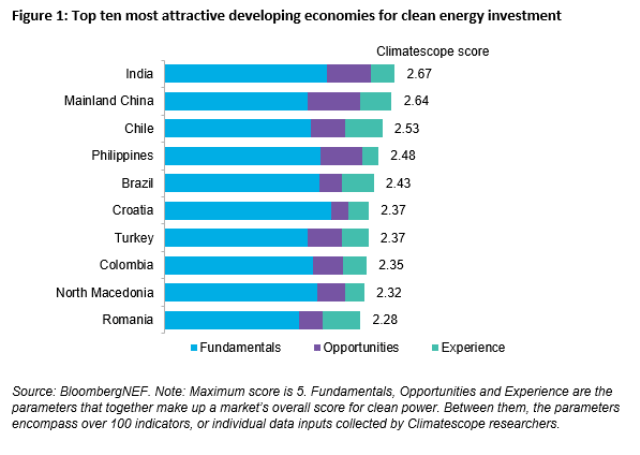In the dynamic landscape of renewable energy investment across developing economies, India emerges as the most appealing destination, securing the top spot in this year’s Climatescope report by BloombergNEF (BNEF). Analyzing progress and attractiveness in clean energy across 110 developing economies, the report underscores India’s ascendancy, closely trailed by mainland China, Chile, the Philippines, and Brazil.
India’s prominent position owes much to its ambitious renewable energy auction program and substantial investments in renewable capacity, propelling it to the zenith of the rankings. Climatescope evaluates economies based on three key parameters: Fundamentals, encompassing pivotal policies, market structure, and potential barriers; Experience, reflecting an economy’s achievements across the clean energy sector; and Opportunities for clean energy investment, assessing a market’s potential for expanding its renewable power supply.
Mainland China secures the second position, retaining its status as the foremost market for clean energy deployment, characterized by significant growth prospects in the immediate future. Chile, last year’s leader, claims third place this year, driven by ambitious renewable energy targets and robust policies fostering investment.
A notable entrant into the top rankings, the Philippines seizes the fourth spot, climbing six places since the previous assessment. The country’s proactive renewable energy auctions and supportive policy environment, especially its ambitious offshore wind roadmap, serve as catalysts stimulating clean energy investment.
Brazil, concluding the top five, ascends from ninth place last year, propelled by a surge in small-scale solar additions. A successful net-metering scheme facilitated the addition of nearly 11GW of solar technology in 2022, cementing Brazil’s pivotal role in renewable energy expansion.
Sofia Maia, BNEF’s head of country transition research, underscores the crucial prerequisites for attracting clean energy investment, emphasizing the need for well-structured power markets and a range of supportive policies aligning with renewable energy targets. The consistent presence of the top-ranked markets in Climatescope’s top ten over the past four years underscores this crucial aspect.
Beyond rankings, Climatescope provides an insightful assessment of the clean power transition across emerging markets, spotlighting encouraging trends. Notably, 102 out of 110 emerging markets have established renewable energy targets. Furthermore, a record-breaking 74 markets installed at least 1MW of solar capacity last year, signaling an accelerating pace in installations.
However, the report unveils a concentration of progress and investment, with 15 emerging markets (excluding mainland China) accounting for a substantial 87 percent of renewable energy investment in 2022. Brazil, India, and South Africa stand as the top three non-Chinese markets for renewables investment, collectively contributing over half of the $80 billion invested in developing economies outside mainland China.
Luiza Demoro, head of energy transitions at BNEF, emphasizes the need for accelerated clean energy investment in developing economies, highlighting the imperative role of informed policymaking and multilateral support. With Brazil slated to host both next year’s G-20 and COP30 in 2025, Demoro underscores Brazil’s potential to catalyze decarbonization progress across the developing world, leveraging its position as the fifth-ranked market in renewable energy investment.

